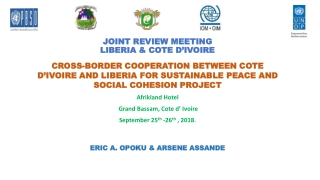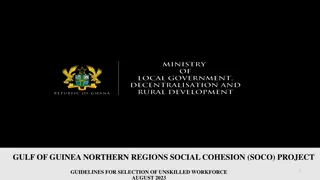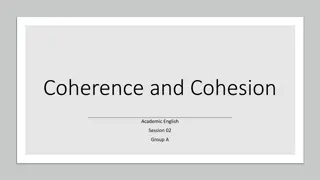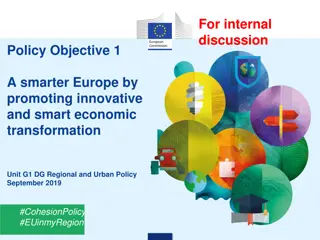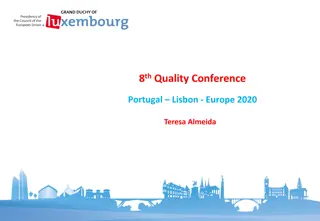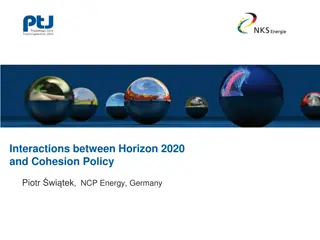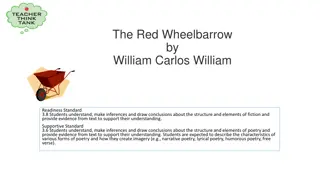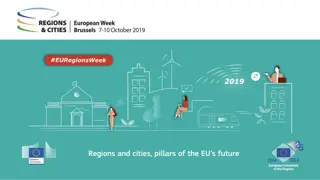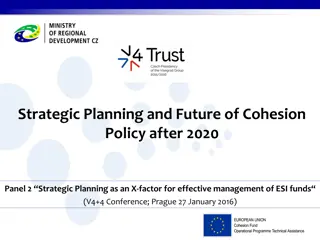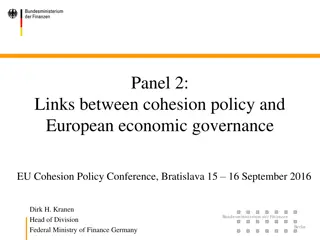
Challenges and Progress in Cohesion Policy 2014-20 and Beyond
Explore the challenges and advancements in cohesion policy from 2014 to the present and beyond, considering economic, political, and institutional contexts. Delve into the impact of the crisis on territorial disparities, the fragility of recovery, and the debate on post-2020 reforms. Gain insights into the eligibility and allocations under the Cohesion Fund and the finalization of the legislative framework for 2014-20. Discover the future scenarios and discussions led by Carlos Mendez of the European Policies Research Centre at the University of Strathclyde.
Download Presentation

Please find below an Image/Link to download the presentation.
The content on the website is provided AS IS for your information and personal use only. It may not be sold, licensed, or shared on other websites without obtaining consent from the author. If you encounter any issues during the download, it is possible that the publisher has removed the file from their server.
You are allowed to download the files provided on this website for personal or commercial use, subject to the condition that they are used lawfully. All files are the property of their respective owners.
The content on the website is provided AS IS for your information and personal use only. It may not be sold, licensed, or shared on other websites without obtaining consent from the author.
E N D
Presentation Transcript
Prospects for Cohesion policy in 2014-20 and beyond: Progress with programming and reflections on the future Carlos Mendez
Prospects for Cohesion policy in 2014-20 and beyond Economic, political and institutional context Cohesion policy in 2014-20 eligibility and allocations progress with programming thematic shifts Post-2020 reform debate and scenarios Questions for discussion Carlos Mendez, European Policies Research Centre, University of Strathclyde 2
Context: The crisis and cohesion The crisis and territorial disparities (6th Cohesion Report) regional disparities have increased since the crisis the recovery is fragile and unevenly spread need for long-term investment to tackle the crisis deterioration in public finances has severely restricted public investment, including co-financing of Cohesion policy tension between Cohesion policy investment goals and EU fiscal consolidation goals 3 Carlos Mendez, European Policies Research Centre, University of Strathclyde
Context: Economic governance developments in the EU The economic policy mix Future developments The Europe 2020 review Partnerships for Growth & Competitiveness Carlos Mendez, European Policies Research Centre, University of Strathclyde 4
Finalisation of the legislative framework for 2014-20 Regulations agreed in December 2013 Common Provisions Regulation for ESIF Fund-specific, ETC and EGTC Regulations Commission decisions (Feb-June 2014) eligibility (Feb), allocations (April), ETC (June), SME initiative (Sept) Delegated and Implementing Acts (Jan-Oct 2014) less than half approved (11/20+) Carlos Mendez, European Policies Research Centre, University of Strathclyde 5
Eligibility and allocations Eligible Population (% of EU) Annual Aid intensity ( per head) Category of Region 2007-13 2014-20 2007-13 2014-20 188 180 Less Developed 31.7 25.4 7.3 13.5 101 66 Transition 61.0 61.0 21 22 More Developed 34.3 25.8 60 62 Cohesion Fund Total 100 84 Carlos Mendez, European Policies Research Centre, University of Strathclyde 6
Financial Allocations Mixed picture of change in national allocations 6,000 20 4,000 10 2,000 - 0 % Change -2,000 -10 millions -4,000 -6,000 -20 -8,000 -30 -10,000 -12,000 -40 IE SK RO PL BG IT FR UK EE SE LT LV BE PT LU HU DK MT CY FI CZ AT ES GR SI NL DE Change % Absolute change m Carlos Mendez, European Policies Research Centre, University of Strathclyde 7
State-of-play of Programming: Commission perspective Half of PAs agreed, but very few OPs adopted Challenges in meeting COM expectations formulating well-defined specific goals setting quantified targets that are ambitious and realistic thematic concentration and targeted investments ex-ante conditionality compliance addressing administrative capacity bottlenecks Carlos Mendez, European Policies Research Centre, University of Strathclyde 8
State-of-play of Programming: Member States perspectives Criticisms of process lengthy Commission observations/negotiations inflexibility of Commission, e.g. thematic concentration Key negotiation issues thematic concentration/targeting - innovation, competitiveness, transport/ICT infrastructure, low-carbon economy, social inclusion coherence of OPs territorial governance/instruments financial management, audit and control technical assistance and management capacity Carlos Mendez, European Policies Research Centre, University of Strathclyde 9
Thematic shifts in funding Shifts in allocations towards Europe 2020 themes 2014-20 2007-13 50 45 41 38 38 40 36 35 32 31 30 29 28 30 27 26 24 23 18 18 20 16 14 14 12 12 9 10 6 0 All countries More developed countries Less developed countries Carlos Mendez, European Policies Research Centre, University of Strathclyde 10
The future of Cohesion policy post-2020 Reform debate has not started yet Commissioner Hahn raised three questions for the future what steps should we take to further simplify? What is the acceptable level of risk? Should GDP remain the main criterion for determining needs and evaluating impact? European institutions (EP, COR) may contribute earlier than in the past Carlos Mendez, European Policies Research Centre, University of Strathclyde 11
Scenarios for post-2020 reform focusing Cohesion policy mainly/only on poor countries or regions retaining Cohesion policy across all regions, including richer areas Cohesion policy funding allocated at national level to countries implications of economic governance debate Carlos Mendez, European Policies Research Centre, University of Strathclyde 12
Scenarios for post-2020 reform: Focusing on poor countries/regions Ecorys (2008), Brueghel (2009), Swidlicki (2014) Strong rationale for CP funding in poorer countries/regions provides financial and institutional capacity redistribution and solidarity between Member States externalities and spillovers effect on other regions and trade preventing emigration from low-income regions better income distribution and stabilisation Weak rationale for CP funding in richer countries/regions Member States have financial and institutional capacity themselves low spillover effects bureaucratic recycling of funds Carlos Mendez, European Policies Research Centre, University of Strathclyde 13
Scenarios for post-2020 reform: Retaining Cohesion policy for all regions Begg (2009), Barca (2009) Rationale for Cohesion policy in all EU Member States is: constitutional: treaty objective implies commitment to support in all Member States and regions political: political and legitimacy arguments for all-region approach - support for this among EU citizens, institutions support from EP, CoR, interest groups economic: contribution to wider economic goals - Lisbon agenda (Europe 2020) supportive framework for the regulation of regional aid under EU Competition policy Carlos Mendez, European Policies Research Centre, University of Strathclyde 14
Scenarios for post-2020 reform: Cohesion funding allocated to countries Sapir (2003), Santos (2009), Marzinetto (2012) Use of country-level criteria for allocating funds focus of policy on convergence between Member States national governments best placed to undertake subnational distribution scope for stronger link with National Reform Programmes policy role of Commission setting of common objectives, coordination strengthening national capacity for regional development peer review selective intervention, as with former Community Initiatives Carlos Mendez, European Policies Research Centre, University of Strathclyde 15
Scenarios for post-2020 reform Implications of economic governance Recent changes in economic governance are reconfiguring EMU direction unclear Limited GEMU little change, few implications for Cohesion policy Comprehensive GEMU major implications: more intrusive oversight of national spending either increased role for Cohesion policy to cope with stabilisation pressures . or Cohesion policy usurped / downgraded through new instruments for stabilisation (Note: LSE/EPRC report for European Parliament) Carlos Mendez, European Policies Research Centre, University of Strathclyde 16
Questions for discussion Will the reforms improve the delivery and performance of Cohesion policy in 2014-20? What is Cohesion policy for - a tool for Europe 2020 or for tackling regional disparities? Who is Cohesion policy for and what is the appropriate level of spatial targeting? How could Cohesion policy be simplified? Carlos Mendez, European Policies Research Centre, University of Strathclyde 17

